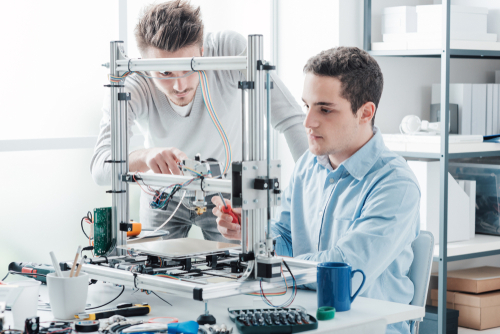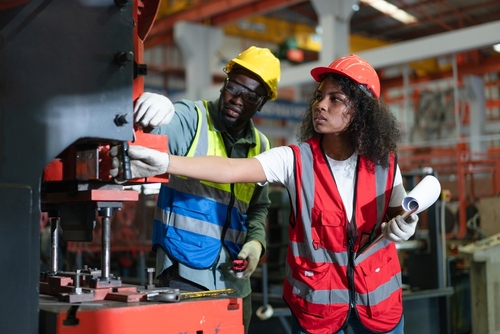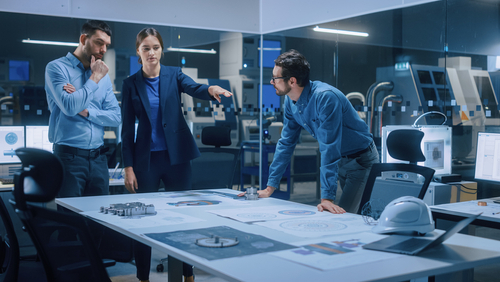Mechanical Engineering Interview Questions - Mechanical engineering is concerned with designing, creating, and maintaining machines, tools, and engines.

Furthermore, its graduates frequently land jobs in businesses that offer engineering services, research, and development.
Read also, 10 Tough Interview Questions and Answers of 2022 (Infographic)
Also, they design different types of items.
These could be anything from batteries to medical equipment. They also work on large projects, including building conveyor systems, escalators, and elevators.
Dr. Job focuses today on the best Mechanical Engineering Interview Questions with answers.

Freshers' Mechanical Engineering Interview Questions:

1. What does the phrase "greenfield project" mean?
An entirely new project constructed without causing pollution is called a greenfield project.
2. What is the name of the alloy of tin and lead?
Solder is tin and leads alloy typically used to create electrical connections.
3. What does pitting mean?
Pitting is a small hole caused by corrosion in the metal.
4. Can you identify the boiler without a steam drum?
A steam drum is not necessary for the supercritical pressure boiler.

5. What kinds of brakes are there?
The many brakes types include:
- Hydraulic brakes
- Electric brakes
- Mechanical brakes
6. What does knurling mean?
The method of knurling involves making a handle-compatible pattern on a bar.
7. What is referred to as an engineering drawing?
Technical requirements and information are transferred through a technical document.
8. Specify the various screws kinds.
Screw Head, Screw Thread Type, and Screw Drive Sorts are the three different types of screws.
9. What does the acronym GD&T mean?
GD&T, or Geometric Dimension and Tolerance, is the acronym.

10. Could you please define coal?
Coal is a sedimentary rock of sulfur, oxygen, hydrogen, and nitrogen.
11. What is AFBC's complete form?
Atmospheric Fluidized Bed Combustion is the full name of this process.
12. How would you define gravity?
It is the ratio of a substance's mass to its density in relation to another substance.
13. When you mention latent heat, what do you mean?
The quantity of heat modifies a material's quality without raising its temperature.
14. Describe case hardening.
It is a technique for hardening the exterior surfaces using low-carbon steel.

15. What is a periscope, exactly?
It is an optical device to observe objects above the line of sight. Submarines are where it is mainly employed.
16. What kinds of gate valves are there?
The various kinds of gate valves include:
- Parallel disk gate
- Single disk gate
- Wedge Gate
17. How to make the pipes behind the wall visible?
Radio waves can be used to accomplish this.
18. In piping design, what is FOF?
The face of Flange is referred to as FOF.
19. What is extrusion?

20. What two types of cooling towers are there?
The two forms of cooling towers are mechanical or induced draft and natural draft.
21. What exactly is ferrite?
A magnetic iron rock is called ferrite.
22. What are the essential elements of perfect gas?
The essential elements of a perfect gas are:
- The state equation must be satisfied.
- The specific heat needs to be stable.
23. What is enthalpy?
Enthalpy is a thermodynamic system's heat capacity.
24. What do you mean by torque?
The force required to twist an object is expressed in terms of torque.

25. What exactly does superheating entail?
The process of superheating involves raising both the fluid's temperature and pressure.
Experienced Mechanical Engineering Interview Questions:

1. Can you tell the difference between heat transfer and thermodynamics?
Thermodynamics shifts an equilibrium state from one to the other: a non-equilibrium process, heat transfer.
2. Why do we use nitrogen in welding?
In welding, nitrogen prevents oxygen and air from penetrating the fused metal.
3. Which gases, besides nitrogen, can be substituted when welding?
Carbon dioxide, helium, and argon can all be used in place of nitrogen.
4. Why do two-stroke locomotive engines emit white smoke?
When a two-stroke locomotive engine runs out of gasoline, white smoke will emanate from the engine.

5. What are turboprop engines?
A turboprop engine used to drive propellers. It is a powerful engine for various types of aircraft.
6. How can you tell a projectile motion from a rocket motion?
A rocket is used in a motion that can accelerate and defy gravitational forces. A force applied to a body during the launch is a projectile motion.
7. What does "orthographic drawing" mean?
An orthographic drawing represents any object in three dimensions. The three faces are the plan, front, and side views.
8. Can you give us some examples of mechanisms we encounter daily?
Turning on a light or winding a clock are two examples of mechanisms used in our daily lives.
9. Can you elaborate on ABFC?
Atmospheric Fluidized Bed Combustion is the full name of ABFC.

10. Do you know how to distinguish between mild steel, cast iron, and high carbon steel?
Cast iron produces thick and brief flashes, whereas mild steel produces medium-density sparks. High carbon steel, meanwhile, has long, dense sparks.
11. Are you aware of the purpose of a biological shield in nuclear power plants?
The biological shield shields one from beta, gamma, and neutron radiation exposure.
12. Could you now define a nuclear reactor?
A nuclear reactor is a facility that manages, sustains, and maintains the nuclear fission chain reaction, preventing radiation exposure.
13. Why is the heat treatment of steel metal necessary?
Ans: Steel metal receives the necessary qualities by heat treatment.
14. What makes the majority of gas containers cylindrical?
The cylindrical shape of gas containers allows them to tolerate high pressure. The sphere can support high internal gas pressure.

15. Is it feasible to utilize motor oil in a hydraulic system?
The best action is to avoid using motor oil in a hydraulic system. The cause is that motor oil contains components that affect seals and other hydraulic system elements.
In conclusion,








 2024-11-01
2024-11-01
 2024-10-31
2024-10-31
 2023-05-04
2023-05-04
 2023-05-03
2023-05-03
 2023-04-26
2023-04-26